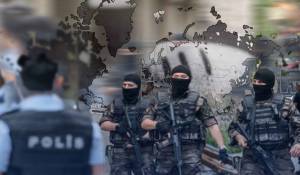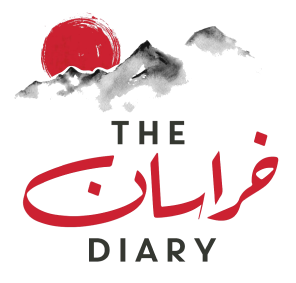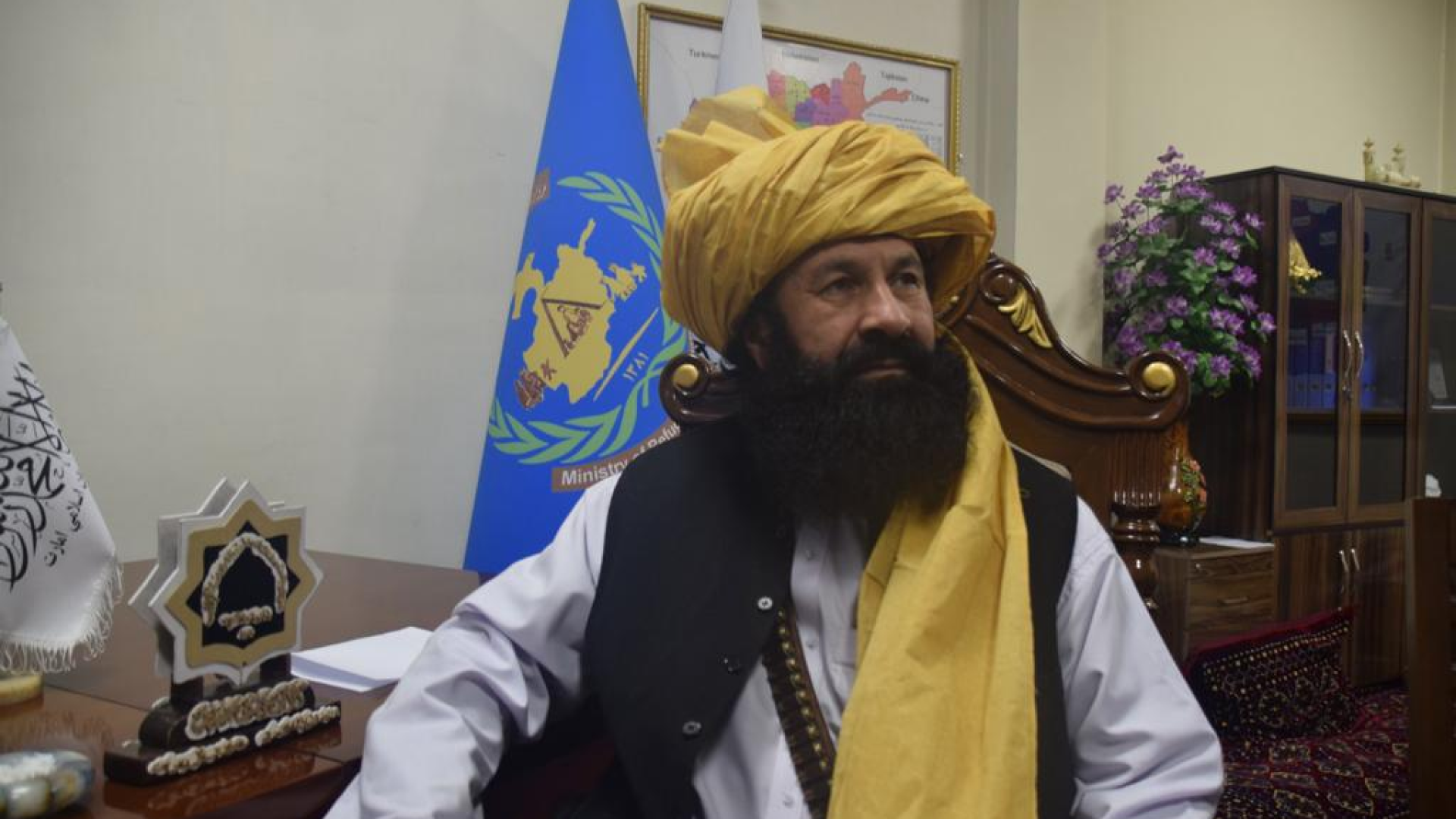
Franz J. Marty

February 21, 2026
By | Franz J. Marty

Khalil al-Rahman Haqqani in his ministerial office in the Afghan capital Kabul, 17th of January 2023 (Franz J. Marty)
The Afghan Taliban’s Interim Minister for Refugees and Repatriation, Khalil al-Rahman Haqqani, spoke to The Khorasan Diary highlighting the return of Afghans to Afghanistan, denying reports on foreign Jihadists in Afghanistan, and criticizing the war on terror.
[Khalil al-Rahman Haqqani is the Taliban’s acting Minister for Refugees and Repatriation since 7th of September 2021, i.e. shortly after the Taliban’s takeover of Afghanistan in August 2021. He hails from Afghanistan’s Paktia province and has participated in the insurgencies against the Soviet and U.S.-led interventions in Afghanistan. He is also seen as a senior key member of the Haqqani Network, a group founded by his late brother Jalaluddin Haqqani, who became famous during the anti-Soviet jihad in Afghanistan in the 1980s.
The Haqqani Network is, due to its alleged links to al-Qa’ida, designated as a terrorist organisation by, amongst others, the United Nations and the United States of America . The US has, due to his activities for the Taliban and allegedly al-Qa’ida, also designated Khalil al-Rahman Haqqani himself as a Specially Designated Global Terrorist and is still offering a bounty of up to U.S. $5 million for relevant information on him. For the same reasons, Khalil al-Rahman Haqqani is also on the United Nations’ sanctions list.
Khalil al-Rahman Haqqani and other members of his family reject the notion of a separate Haqqani Network and assert that they are part of the Islamic Emirate of Afghanistan better known as the Taliban. He also rejects links to al-Qa’ida and displays his activities as a legitimate defensive fight against invaders.]
On 17th of January 2023, The Khorasan Diary sat down with Khalil al-Rahman Haqqani, the Taliban’s acting Minister for Refugees and Repatriation whom the U.S. still deems a terrorist. This marked the first extensive interview that Khalil al-Rahman Haqqani ever gave to a foreign news outlet.
Khalil al-Rahman Haqqani explained why more Afghans are returning to their home country than leaving it; assured that the Taliban are addressing severe economic problems that still make many Afghans want to leave their country; rejected reports about the presence of Pakistani and Tajikistani jihadists on Afghan soil; and heavily criticised the United States of America and NATO for their past military operations in Afghanistan.
The interview was held in Khalil al-Rahman Haqqani’s office in the Ministry of Refugees and Repatriation in the Afghan capital Kabul. The below transcript is a translation of this author that was, for the sake of clarity and brevity, slightly edited.
The Khorasan Diary: According to statistics of the International Organisation for Migration, since spring 2022 there are more Afghans returning to Afghanistan than emigrating from Afghanistan. What is the reason for this?
Khalil al-Rahman Haqqani: In the name of Allah, the merciful and compassionate, the reason that more Afghans have been returning to their home country than leaving it is that, since the [Islamic] Emirate [i.e. the Taliban] took over Afghanistan the [U.S.] occupation has ended and that also the killing, corruption, and oppression has, thank be to Allah, ended. Afghanistan has become safe. Before there was war, murders, bombardments, raids, oppression, barbarism. Furthermore, now there is one single government in Afghanistan, an Islamic system with one single emir. All Afghans want such an Islamic system. This provides security and justice. Before [in the time of the Afghan Republic that the Taliban overthrew in August 2021], there were many different governments in Afghanistan. There was one government in the north, another in the south and east and west and in the centre and this caused problems. [Note: This is a reference to allegations that, under the Afghan Republic, various Afghan strongmen ran their own fiefdoms in various parts of Afghanistan.]
TKD: But that more Afghans returned to their homeland than left it did not come directly with the return of the Taliban to power. It only started in spring 2022, about six-seven months after the Taliban took over Afghanistan. Your reply does not explain this.
At the beginning there was a lot of propaganda from foreigners. Foreigners told Afghans that everything was bad in the Emirate and that it was dangerous. Some Afghans believed this and were afraid. Therefore, they fled the country. Afterwards, they saw that this is not the case.
TKD: In spring 2022, the Islamic Emirate of Afghanistan announced that it will close down illegal routes from the southwestern Afghan province of Nimruz to Iran. These routes were used by most Afghans who illegally emigrated from Afghanistan. Has this happened? And if so, how?
Afghanistan has very long borders. Unfortunately, first there was not the capability to control the whole border and in the past there has been a lot of human trafficking of Afghans to Iran. We tried to change this and shut down the majority of these illegal routes and people cannot emigrate on this way anymore. The Emirate has now border security forces that do this. I admit that some Afghans still use some of these smuggle routes to get illegally to Iran. The border is long and we cannot control it 100%. No one can do this. Also countries like Greece, other European nations, and the United States of America cannot 100% control migration at their borders. But we try. And the majority of this human trafficking has stopped.
TKD: Looking to Pakistan, there are, according to the International Organisation for Migration, still more Afghans emigrating to Pakistan than returning from Pakistan. Why is that?
There are religious, cultural, and tribal links between Afghanistan and Pakistan. There are the same [Pashtun] tribes on this side and that side of the Durand line [The Afghan-Pakistani border that is not recognised by Afghanistan]; one brother is on this side, the other brother is on the other side. It is not possible to close the Durand line. People have relatives, houses, investments on both sides [of the Durand line]. A lot of tribal people have one home here in Afghanistan and one in Pakistan. They also go to Pakistan for trade, to get medical treatment, or education. This [migration] has always existed. [Afghanistan and Pakistan] is like one house. To go to Pakistan is easier than to go to Iran.
TKD: Unfortunately, there is still a large number of Afghans who want to emigrate from their country and start a new life somewhere else. Many Afghans ask me and other foreigners how they can leave Afghanistan. Why is this the case?
Many Afghans want to leave Afghanistan to trade or get medical treatment or education. This was also in the past the case. The other problem is that since one and a half years [i.e. since the Taliban’s return to power], there has been propaganda [against the Taliban] and many Afghans were afraid to stay in Afghanistan. But this has changed and people are not anymore afraid. Some foreigners even offer Afghans money to leave their country. They want to pull them out.
TKD: But a lot of Afghans who ask me personally whether I could get them out of Afghanistan do so because they say there is no work and no future in Afghanistan, because the economy is in shambles. They don’t want to just go out of Afghanistan to work or get an education. They want to leave Afghanistan for good to live somewhere else, wherever it is possible. Is the economic situation a problem that drives Afghans out?
Afghanistan suffered 40 years of war. There was no possibility to develop factories, mines, and the economy. We started efforts to change this, to develop the economy, to exploit the mines [that Afghanistan has]. The Islamic Emirate tries to provide people with the opportunity to make a living in Afghanistan so that they do not want to leave anymore. But this needs time. There was also a lot of propaganda [against the Taliban], but now the situation has changed and is further changing. If 1’000 Afghans leave the country, there are 2’000 others who come back. [Note: According to data compiled by the International Organisation for Migration, between spring 2022 and the end of December 2022, there has indeed been a change, namely that numbers of Afghans returning to Afghanistan began to surpass the numbers of Afghans leaving Afghanistan. This was, however, by far not in the ratio indicated by Khalil al-Rahman Haqqani and also includes Afghans who were deported to Afghanistan.]
TKD: To raise another topic, there are some refugees from countries like Pakistan or Tajikistan who came to Afghanistan and live here because they had problems in their home countries. Is your ministry responsible for these foreign refugees in Afghanistan? And if so, what are you doing about them?
There were some refugees [in Afghanistan] during the past regime [i.e. the Afghan Republic], but after the success of the Islamic Emirate of Afghanistan [in overthrowing the Afghan Republic in August 2021] no one has come to us as refugee.
There are refugees from Waziristan [area in Pakistan] living in camps in [the southeastern Afghan provinces of] Khost and Paktika. They fled war in Waziristan. Our departments of refugees in the provinces of Khost and Paktika are helping them as has also been the case before [during the time of the Afghan Republic].
TKD: Maybe they are not officially registered refugees, but I know for a fact that there are some people from Tajikistan living in northern Afghanistan. They are friends of friends of mine. There are people from [the former tribal agency of] Momand and Swat [both areas in Pakistan] living in [the eastern Afghan provinces of] Kunar and Nangarhar. I know some of them personally and have met them inside Afghanistan. So if they are not the responsibility of your ministry, is there another [Taliban] ministry or authority responsible for them or how is this handled?
No one came as refugee to us, except the refugees from Waziristan living in Khost and Paktika for whom our provincial departments are providing services and assistance.
TKD: So you are denying that these men from Momand and Swat — men whom I know personally and have met inside Afghanistan and who have told me that they came as refugees to areas in Afghanistan other than Khost and Paktika — exist?
I have no information about such people and cannot confirm this.
TKD: The governments of Pakistan and Tajikistan are saying that amongst such Pakistani and Tajikistani refugees in Afghanistan are also militants. For example, the Pakistani government is asserting that some of these refugees are members of the Tehrik-e Taliban Pakistan [which fights the Pakistani government] and the government of Tajikistan is saying that some of the refugees from Tajikistan in Afghanistan are members of Ansorullah Tajikistan [an Islamist group whose stated goal is the overthrow of the current government of Tajikistan that it sees as infidel]. What is your comment on this?
We strongly deny the existence of people from such groups in Afghanistan.
TKD: You are still on the U.S. Most Wanted List and the U.S. government has so far not rescinded the offer of a reward of up to 5 million U.S.$ for information that leads to your arrest. What is your reaction to this?
I take pride in this. The Americans have acted unjustly. I have never attacked the White House. They attacked my house. More than once. They have oppressed me and other Afghans. So if I am on the Most Wanted List and there is a bounty on my head from such a country, I take pride in this. Afghans had never attacked Americans or other foreigners, it was them who attacked us first. They attacked my house more than five times. The first time, they attacked my house and my madrassa in [the southeastern Afghan province of] Khost during [the U.S. administration of President Bill] Clinton. [Note: This is an apparent reference to the U.S. Operation Infinite Reach, in which, on 20th of August 1998, ships of the U.S. Navy stationed in the Arabian Sea fired Tomahawk cruise missiles hitting targets in Khost. The U.S. government conducted this attack in retaliation for simultaneous bombings of the U.S. embassies in Kenya and Tanzania that were claimed by al-Qa’ida. U.S. and other accounts indicate that the hit compound(s) in Khost were used by al-Qa’ida. Khalil al-Rahman Haqqani’s above statement rejects this.] The second time they attacked my house in Wazir Akbar Khan [an affluent neighbourhood] in Kabul; this was when [the U.S. administration of President George W.] Bush launched their attack on Afghanistan [in the wake of the terror attacks of 11th of September 2001]. The third time they attacked my house in Gardez, the capital of Paktia Province; this was when we left Kabul [in the immediate aftermath of U.S. bombings of Afghanistan in autumn 2001]. The fourth time, they attacked my native village in Zadran [a district in the Afghan province of Paktia located south of Kabul]. Then they attacked a tribal meeting of people from Loya Paktia [Greater Paktia, including Paktia and neighbouring provinces] in which I participated. Then they attacked our family’s house in Khost. Then they also attacked me when I was a refugee in Pakistan; drones were over us for hours before the strike. In each attack, they martyred and injured many of my family members, sometimes dozens at once and all in all in the hundreds. They also killed women and children in these strikes. They claimed that Osama [Bin Laden] was there with us, that other Arabs were there with us. Osama was not there. There were also no other Arabs there. They were all Afghans. [Note: Various accounts, including from Taliban, explicitly acknowledge that Osama Bin Laden was before, during, and at least for some time after the 9/11 attacks somewhere in Afghanistan and that the Taliban did, after the 9/11 attacks, refuse to hand him over to the United States of America.]
TKD: What, if any, is your message to the world?
I and all Afghans have the right and want that the American and NATO attacks against Afghanistan and Afghans are tried in an international court. The world and everyone should ask themselves the question: who were the terrorists? The Haqqanis or the United States and NATO? This has to become clear and history will judge on this. Did we invade them or they us? They repeatedly attacked my houses and my family without reason. The world and the United Nations should investigate whether there was any Afghan involved in the attacks on the World Trade Center [in New York on 11th of September 2001]. If Afghans were involved they should face justice. But if Afghans were not involved, then the Americans should be tried for attacking Afghanistan and Afghans. This is the right of Afghans and this is what we want. I can tell you, no Afghan was involved [in the attacks of 11th of September 2001]. And no Afghan supplied anything to the people who did this. [Note: There was indeed no Afghan among the 9/11 hijackers. The reason for the U.S. intervention in Afghanistan in the wake of 9/11 was that the U.S. accused the Taliban of sheltering al-Qa’ida and its leaders, including Osama Bin Laden.] It is also important to note that Afghans, never in history, have attacked another country. But we have suffered immense barbarism from the Soviet Union and NATO that invaded us. I have a lot of information on all that happened and, Allah willing, will someday publish a book about all of it. [Note: U.S. and other accounts insist that the Haqqani Network to this day remains in contact with and supports al-Qa’ida. The Haqqani Network, an alleged group led by members of Khalil al-Rahman Haqqani’s family, is an integral part of the Taliban, but separately listed as a terrorist organisation by, amongst others, the United States of America and the United Nations.]